Standing waist-deep in rushing waters, Capt. Robert Burke ’05 patiently threads his tackle.
His rod tightly tucked under his arm, he pinches the line to tie the fly.
Amid the shimmering waters, he clutches the reel and casts. The metronome motion scrapes the fly gently on the water. The line moves in gentle loops and waves.
Here in this natural sanctuary, Burke’s head runs as clear as the water. For him and his fellow soldiers, it’s a place to heal, hope and think.
Standing on the cold, dark streets of a village near Hawijah, Iraq, then-1st Lt. Robert Burke carefully leads his platoon.
His rifle tightly tucked under his arm, he clutches the trigger
as he steps closer to inspect a residence. The weapon protects him from enemy insurgents who might be waiting inside.
As he approaches the house, there’s a bright flash of gunfire followed by darkness and the distinct sound of a Black Hawk helicopter rotor beating the wind.
Burke had been shot in the arm, leg and torso. Another bullet had blown the chinstrap of his helmet off his face. He
was immediately flown to Germany and then to Walter Reed Medical Center in Washington, D.C.
“Am I going to be able to pick up a bat again?” the Laker infielder remembers thinking on that medevac flight in February 2008. “Would I be able to pick up a glove and play catch with my [kid] in the future?
“Am I going to be able to do my job again?”
‘OK, I’m alive. What do I do next?’
It would take two and a half weeks for Burke to start walking again and some six months before he was released from the Warrior Clinic at Walter Reed.

Capt. Robert Burke ’05 shows his catch during a Project Healing Waters outing on Maine’s Rapid River in 2008. Burke started a Fort Drum Healing Waters chapter in 2009.
Those were pretty dark times for Burke, who had always been an athlete and was anxious to return to the military.
The first thing I realize is “OK, I’m alive. What do I do next?” says Burke. He knew he wanted to marry his fiancée and continue his Army career, but beyond that, he felt limited in what he could do.
His mood changed when he met a fellow soldier at Walter Reed. A survivor of a roadside bomb explosion, he had died and been revived several times on the operating table.
“What are you doing this weekend?” the soldier posed to Burke. That was his introduction to Project Healing Waters, a national organization that promotes fly fishing as therapy for wounded servicemen and women. It was also a new beginning for Burke.
“This was something that gave me a little hope that if I can do this, I can do anything,” he says. “[Fishing is] quiet. You get a lot of time to think, a lot of time to wonder. It can help you connect to the thought process of the way you were.”
A call to service
Oswego sophomore Rob Burke was getting ready to head to class — a 100-level meteorology course, he remembers — when the World Trade Center was attacked by terrorists Sept. 11, 2001. It made an immediate impact.
“I was considering quitting school and enlisting,” says Burke. “I think I had the overall goal of doing some type of service, military or civil. That kind of service molds somebody. It makes somebody a better person.”
His father, who had dropped out of college to enlist in the Marine Corps during the Vietnam War, convinced him otherwise. So, Burke earned his public justice degree and played out his collegiate career in baseball.
But Burke wasn’t interested in going pro as a ballplayer or a police officer.
His passion was in service. Volunteering in soup kitchens, in high school mentoring programs and abroad “spurred a feeling of doing service, doing something for the greater good,” says Burke, who was commissioned second lieutenant in the U.S. Army in May 2006 and deployed to Iraq as an infantry platoon leader.
For Burke, Healing Waters was another call to service — this time to his fellow soldiers. Oswego Dean of Students Emeritus Bob Rock got involved as a member of Trout Unlimited and today he participates in PHW outings and fly-tying classes.
“[Burke’s] work with Project Healing Waters is volunteer and he’s devoted himself to it,” says Rock. He’s seen the program change lives right before his eyes — soldiers who’ve had surgeries, amputations and mental trauma.
Walk, crawl, run
In the Army, soldiers are taught the mantra “walk, crawl and run.” In Project Healing Waters, the walk is practicing on the lawn, the crawl is casting on the pond and the run is getting into the river.

Burke, shown here in Iraq while sporting his Oswego cap, was seriously wounded by enemy gunfire in 2008.
“These are small personal victories,” Burke says. “Those small victories can create opportunity.
“That gives you confidence and builds your self-esteem,” he says.
Burke knew the Salmon River and other alluring waters of Central New York would be a perfect fit for a Healing Waters chapter at Fort Drum, so he set out to make it happen.
Now he was the one hanging out on the lawn and making practice casts in an effort to draw curious Fort Drum soldiers to the program, which has chapters coast to coast.
“It was great seeing guys get out there,” says Burke, who got the Fort Drum chapter off the ground in 2009. In addition to the personal solace, there was plenty of social interaction – Vietnam veterans conversing with Iraq vets, Gulf War soldiers casting with those returning from Afghanistan.
The chapter’s first Salmon River outing in September 2009 drew four soldiers. There are about 15 active members of the Fort Drum chapter. Burke plans to do more outings with multiple New York chapters this spring.
Last call
Burke is proud of his role in creating the Fort Drum Healing Waters chapter and while the program has been essential to his own recovery, he still heard one more calling.

Burke, shown casting on the Salmon River in 2008, credits Project Healing Waters with changing his outlook on life after he was injured in the line of duty.
“For me, I felt like I didn’t complete my military service,” says Burke, who has been stationed in the Kunduz Province of Afghanistan since March. “This deployment was an opportunity to complete my healing.”
He wants to settle down in Cicero, where he lives with his wife, Catherine Maloney Burke ’05. Of course, he wants to do more fishing.
And someday, thanks to those healing waters, he will be able to play that game of catch with his future son or daughter.
Also: Alumna Cares for Wounded Warriors
You might also like
More from Featured Content
Vision for the Future
VISION for the Future Peter O. Nwosu began his tenure as the 11th president of SUNY Oswego, building on the solid …
Envisioning the Potential in All Students
ENVISIONING the Potential in All Students Educator donates $2 million in recognition of his Oswego education, in support of future teachers Frank …
A Vision of Support
A VISION of Support Award-winning principal makes an impact on her school through her positivity and commitment When Nicole Knapp Ey ’02 …

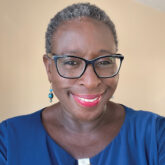

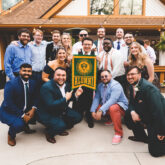

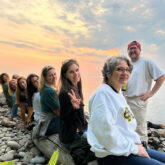
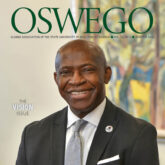


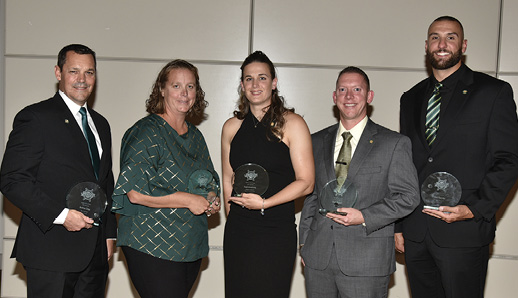
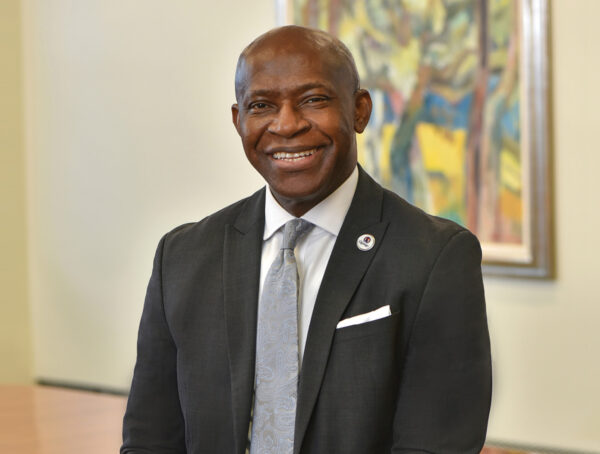



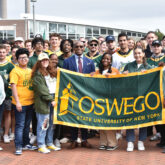
8 Comments
He is a real American hero, a red-blooded GI Joe to the core. He answered the call to defend his country, and he got injured because of it. A famous saying goes like this: things that don’t kill you make you stronger. Now that he is holding a fishing rod instead of a rifle, the battle he fights is on the river. I wish him and his family all the best.
A very thoughtful comment, Ellen. Thanks for reading!